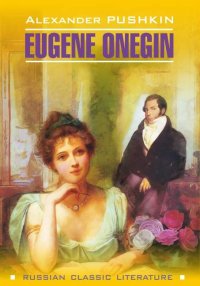Евгений Онегин
Покупка
Тематика:
Английский язык
Издательство:
КАРО
Автор:
Пушкин Александр Сергеевич
Перевод:
Сполдинг Г.
Год издания: 2018
Кол-во страниц: 288
Дополнительно
Вид издания:
Художественная литература
Уровень образования:
ВО - Бакалавриат
ISBN: 978-5-9925-1230-4
Артикул: 720303.01.99
Предлагаем вниманию читателей роман в стихах А. С. Пушкина «Евгений Онегин», одно из самых значительных произведений русской литературы. Критик В. Г. Белинский назвал его «энциклопедией русской жизни». Переводчик Г. Сполдинг составил подробный комментарий реалий русской жизни.
Тематика:
ББК:
УДК:
- 372: Содержание и форма деятельности в дошк. восп. и нач. образов-ии. Метод. препод. отд. учеб. предметов
- 811111: Английский язык
ОКСО:
- ВО - Бакалавриат
- 45.03.01: Филология
- 45.03.02: Лингвистика
- 45.03.99: Литературные произведения
ГРНТИ:
Скопировать запись
Фрагмент текстового слоя документа размещен для индексирующих роботов
RUSSIAN CLASSIC LITERATURE
Alexander PUSHKIN
EUGENE ONEGIN
Translated by H. Spalding
KAPO
Санкт-Петербург
УДК 372.8
ББК 81.2 Англ-93
П91
Пушкин, Александр Сергеевич.
П91 Евгений Онегин : пер. с рус. Г. Сполдинга. — СПб. : КАРО, 2018. — 288 с. — (Русская классическая литература на иностранных языках).
ISBN 978-5-9925-1230-4.
Предлагаем вниманию читателей роман в стихах А. С. Пушкина «Евгений Онегин», одно из самых значительных произведений русской литературы. Критик В. Г. Белинский назвал его «энциклопедией русской жизни». Переводчик Г. Сполдинг составил подробный комментарий реалий русской жизни.
УДК 372.8
ББК 81.2 Англ-93
ISBN 978-5-9925-1230-4
© КАРО, 2017
Petri de vanite, il avait encore plus de cette espece d’orgueil, qui fait avouer avec la meme indifference les bonnes comme les mauvaises actions, suite d’un sentiment de superiorite, peut-etre imaginaire. Tire dune lettre particuliere.
Canto the First
‘He rushes at life and exhausts the passions.’
Prince Viazemski
I
“My uncle’s goodness is extreme, If seriously he hath disease;
He hath acquired the world’s esteem
And nothing more important sees;
A paragon of virtue he!
But what a nuisance it will be,
Chained to his bedside night and day
Without a chance to slip away.
Ye need dissimulation base
A dying man with art to soothe,
Beneath his head the pillow smooth,
And physic bring with mournful face, To sigh and meditate alone:
When will the devil take his own!”
5
II
Thus mused a madcap young, who drove Through clouds of dust at postal pace, By the decree of Mighty Jove, Inheritor of all his race.
Friends of Liudmila and Ruslan¹, Let me present ye to the man, Who without more prevarication The hero is of my narration!
Onegin, O my gentle readers, Was born beside the Neva, where It may be ye were born, or there Have shone as one of fashion’s leaders. I also wandered there of old, But cannot stand the northern cold².
III
Having performed his service truly, Deep into debt his father ran;
Three balls a year he gave ye duly, At last became a ruined man.
But Eugene was by fate preserved, For first “madame” his wants observed, And then “monsieur” supplied her place³;
6
The boy was wild but full of grace. “Monsieur l’Abbe” a starving Gaul, Fearing his pupil to annoy, Instructed jestingly the boy, Morality taught scarce at all; Gently for pranks he would reprove And in the Summer Garden rove.
IV
When youth’s rebellious hour drew near And my Eugene the path must trace — The path of hope and tender fear — Monsieur clean out of doors they chase. Lo! my Onegin free as air, Cropped in the latest style his hair, Dressed like a London dandy he The giddy world at last shall see. He wrote and spoke, so all allowed, In the French language perfectly, Danced the mazurka gracefully, Without the least constraint he bowed. What more’s required? The world replies, He is a charming youth and wise.
7
V
We all of us of education
A something somehow have obtained, Thus, praised be God! a reputation With us is easily attained.
Onegin was — so many deemed [Unerring critics self-esteemed], Pedantic although scholar like, In truth he had the happy trick Without constraint in conversation Of touching lightly every theme. Silent, oracular ye’d see him Amid a serious disputation, Then suddenly discharge a joke The ladies’ laughter to provoke.
VI
Latin is just now not in vogue, But if the truth I must relate, Onegin knew enough, the rogue A mild quotation to translate, A little Juvenal to spout, With “vale” finish off a note;
Two verses he could recollect
8
Of the Aeneid, but incorrect. In history he took no pleasure, The dusty chronicles of earth For him were but of little worth, Yet still of anecdotes a treasure Within his memory there lay, From Romulus unto our day.
VII
For empty sound the rascal swore he Existence would not make a curse, Knew not an iamb from a choree, Although we read him heaps of verse. Homer, Theocritus, he jeered, But Adam Smith to read appeared, And at economy was great;
That is, he could elucidate
How empires store of wealth unfold, How flourish, why and wherefore less If the raw product they possess The medium is required of gold. The father scarcely understands His son and mortgages his lands.
9
VIII
But upon all that Eugene knew I have no leisure here to dwell, But say he was a genius who In one thing really did excel. It occupied him from a boy, A labour, torment, yet a joy, It whiled his idle hours away And wholly occupied his day — The amatory science warm, Which Ovid once immortalized, For which the poet agonized Laid down his life of sun and storm On the steppes of Moldavia lone, Far from his Italy — his own.
IX
How soon he learnt deception’s art, Hope to conceal and jealousy, False confidence or doubt to impart, Sombre or glad in turn to be, Haughty appear, subservient, Obsequious or indifferent!
What languor would his silence show,
10


